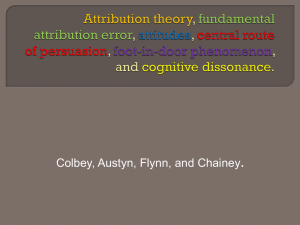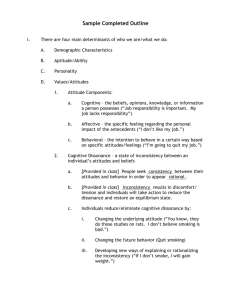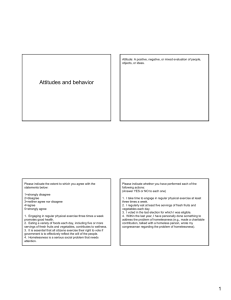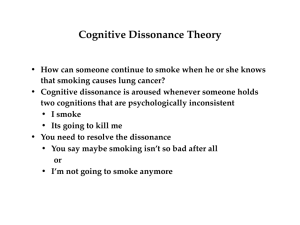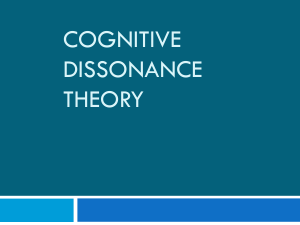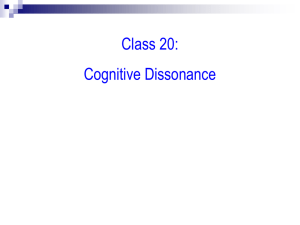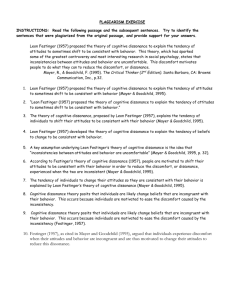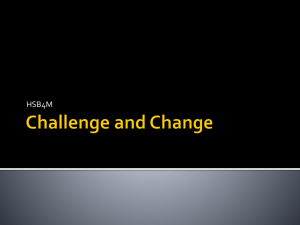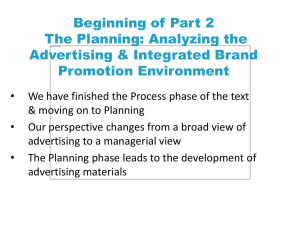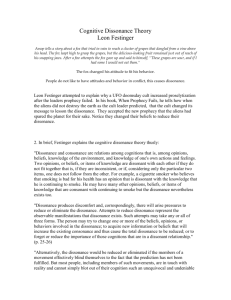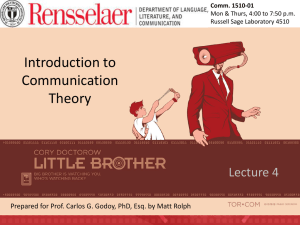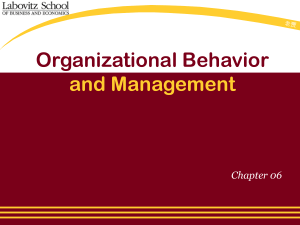Cognitive Dissonance Theory
advertisement
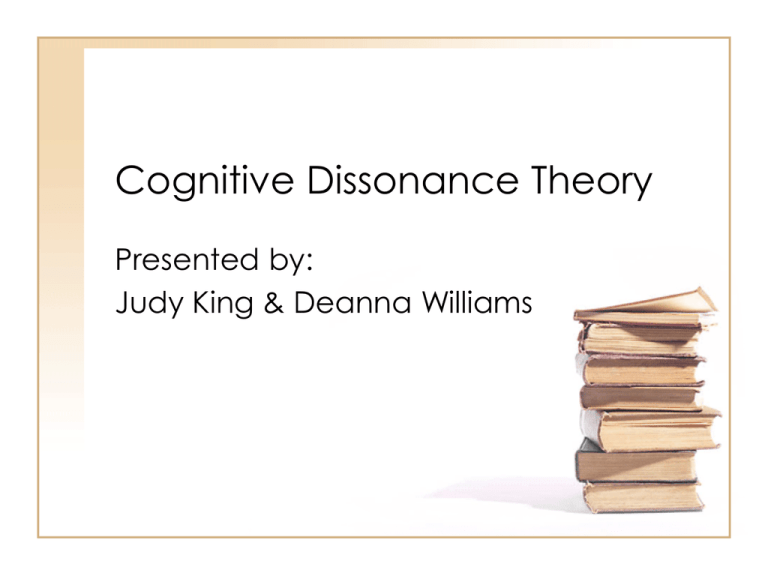
Cognitive Dissonance Theory Presented by: Judy King & Deanna Williams Leon Festinger (1919-1990) • Social psychologist from New York City • Bachelor of Science degree from the City College of New York in 1939 • Ph.D. in 1942 at the University of Iowa • Studied under Kurt Lewin, – often considered the farther of social psychology • Taught at University of Iowa, University of Rochester, the Massachusetts Institute of Tech., University of Minnesota, University of Michigan, and Stanford University. • Finished at the New School for Social Research in New York City until his death in 1990. What is Cognitive Dissonance? Distressing mental state people feel when they find themselves doing things that don’t fit with their opinions or what they know. An aversive drive that goads us to be consistent. 3 Ways to Reduce Dissonance between attitudes & actions – Hypothesis 1: Selective Exposure Prevents Dissonance • Avoid anything that causes discomfort – Hypothesis 2: Postdecison Dissonance Creates a Need for Reassurance • “Is that Ok?” – Hypothesis 3: Minimal Justification for Action Induces a Shift in attitude • Behavior → Attitude example Persuading Change of behavior Change of attitude Festinger says we should attempt to persuade others by changing their behavior which will change their attitude. Behavior Attitude When dissonance occurs... We • Change our behavior. • Justify our behavior by changing the conflicting cognition. • Justify our behavior by adding new cognitions. Dissonance Theory Makes a Comeback • Elliot Aronson • Dept. of Psychology • University of California, Santa Cruz Graduate Student at Stanford under Festinger in mid-1950s Aronson says of CD Theory “It is essentially a theory about sense making—how people try to make sense out of their environment and their behavior—and thus, try to lead lives that are (at least in their own minds) sensible and meaningful.” Aronson adds... Aronson elaborated on the centrality of the self-concept in the experience and reduction of dissonance and suggests most individuals strive for 3 things: 1. To preserve a consistent, stable, predictable sense of self. 2. To preserve a competent sense of self. 3. To preserve a morally good sense of self. What would YOU do? Festinger’s Experiment with lying college students • Offered money to student workers to lie • Some did not lie even when amount was increased • Some did lie for $1 but changed their minds about the truth • Some did lie but only for $20 which they thought justified lying. Justification... • Cognitive dissonance says that people felt bad about lying for $1 because they could not justify the act, so they said no or changed the truth. • Those who were paid $1 and DID lie must have really enjoyed it (because $1 does not justify the act). • Those who were paid $20 and lied with no dissonance were justifying doing it for the money. 3 Revisions to Cognitive Dissonance Theory • Search for self-consistency • Personal responsibility of bad outcomes • Self-affirmation to dissipate dissonance Three State of the Art Revisions: The Cause and Effect of Dissonance Em Griffin, A First Look at Communication Theory, p. 233-234 Search for Self-Consistency I would never do that... •Shave my head •Run 20 miles a day •Sleep in a room with 5 other men •Eat bugs and wild plants Boot Camp! Personal Responsibility for Bad Outcomes • Knowledge that one’s actions have unnecessarily hurt another. – Natalie on p.236 Self-Affirmation to Dissipate Dissonance • I just did whatever everyone else did • If push comes to shove, I’ll say it was my brother • If I had known, I wouldn’t have done it • I could probably get away with calling in sick... Using Cognitive Dissonance to your advantage Persuasive Communication using the theory • Invoking dissonance • Creating a wedge of doubt or interest • Encouraging change of behavior • Supporting/assuring after change in attitude Media Clips on Cognitive Dissonance • “Crazy in Alabama” – a small town experiences an incident that causes conflict and promotes dissonance which is handled differently by different people • “Secondhand Lions” – Two rich old bachelors spend their days in the country sitting on their front porch and chasing away door-to-door salesman until a young man comes to live them
